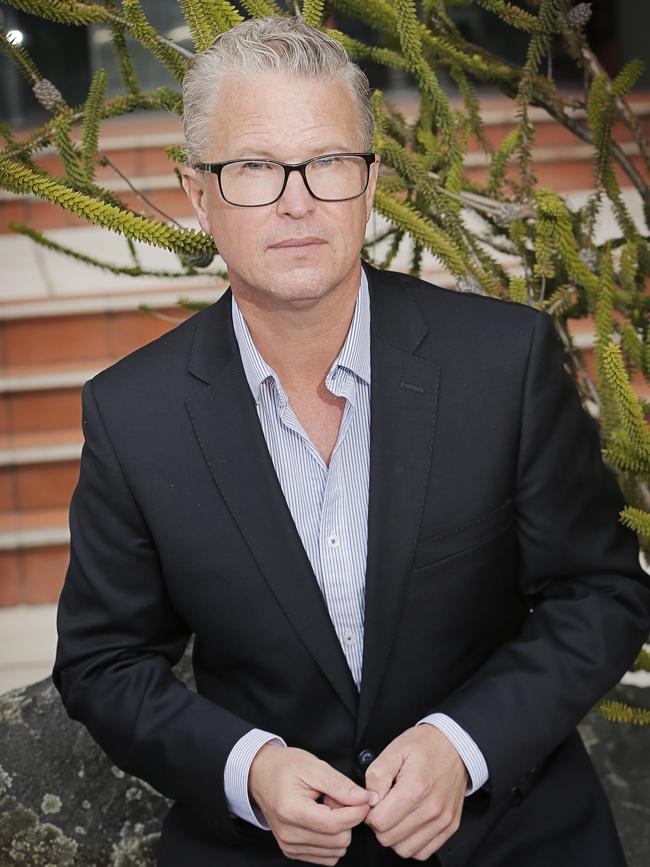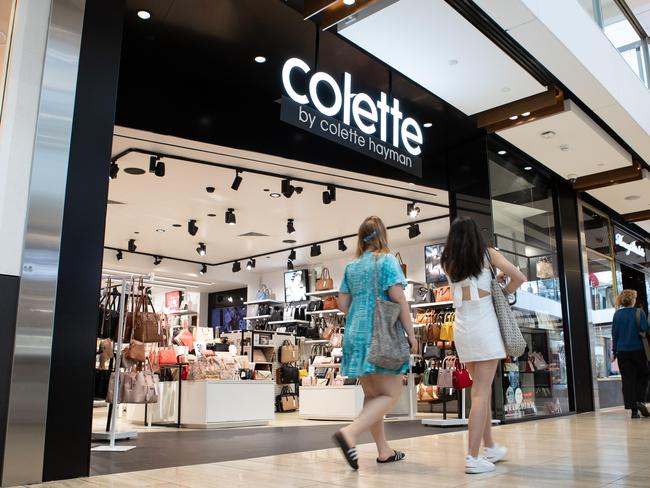Dozens of Qld retail stores close in horror year
Hundreds of people have been left without jobs after the closure of 109 high-profile retail stores across the state, but experts tip the worst is to come. SEE THE LIST

QLD Business
Don't miss out on the headlines from QLD Business. Followed categories will be added to My News.
Major retail chains have slashed more than 109 Queensland stores in the past year, but the disaster is tipped to continue as COVID-19 support ends and consumers embrace online shopping.
Analysis by The Courier-Mail has revealed 109 major brand stores were closed this year - kicked off in the retail ‘killing season’ in January when Colette by Colette Hayman and Aussie fashion chain Jeanswest collapsed.
Colette would end up closing 25 stores in Queensland this year, representing the biggest single retail casualty.
But that could be dwarfed by Mosaic Brands which last month flagged the closure of 300 to 500 of its 1400 stores across the country in the next two years.
Mosaic, which owns brands such as Millers, Rockmans and Katies, has 315 stores scattered across Queensland, which means it could shut the doors on up to 112 stores in the state.
Mosaic managing director Scott Evans said the retail rental market in Australia was “not paused because of the pandemic – it is fundamentally changed for the future”.
“Some though not all landlords accept that reality, so while exact locations and numbers are to be determined, the group anticipates potentially 300-500 store closures over the coming 12-24 months,” he said.

QUT retail expert Gary Mortimer said the industry was likely to deteriorate further in the next 12 to 18 months.
He said retailers were currently benefiting from the economic boost provided by the federal government’s JobKeeper and JobSeeker payments.
“JobKeeper and JobSeeker will eventually start to wind back so there will be less money coming into businesses,” Dr Mortimer said.
“On top of that we have retailers who have negotiated either rent-free periods or reductions in rent and eventually those... are going to come to an end as well.
“We may see a number of retailers fall over that cliff.”
The Australian Retailers Association CEO Paul Zahra said his organisation was “cautiously optimistic” about the trajectory of Queensland’s recovery. But the tapering off of stimulus measures could put the brakes on the recovery.
“(But) the spoils of recovery haven’t been shared evenly, with discretionary categories like fashion and footwear being heavily impacted by the pandemic as people are staying at home. We remain very concerned for these stores, as well as retailers who depend on tourists,” Mr Zahra said.
He said the upcoming Christmas shopping period would be “make or break” for many businesses.
Mr Zahra said there would likely be more store closures unless landlords reassessed rent levels which, in some cases, were excessive.
“We would also like to see the Queensland Government extend its commercial rent relief scheme beyond 30 September to give the hardest hit retailers more time to get back on their feet,” he said.
“The looming debt overhang from rent deferrals will also be a challenge for many, and we hope that landlords will do their part to help secure a sustainable recovery for their tenants.”
Dr Mortimer said the growth in online shopping would also result in retailers’ “right sizing” their networks and closing stores.
According to the latest NAB Online Retail Sales Index, Australians spent $37.4bn on online retail in the 12 months to July, representing around 11.1 per cent of the country’s total retail trade.
Retail Doctor Group CEO Brian Walker said COVID-19 had accelerated some trends, such as the growing focus on an “omni channel” strategy, which embraces both physical stores and an integrated online presence.
“Good retailers were looking to have less physical stores and, over time, better physical store experiences,” Mr Walker said.
He said the immediate future will depend on the role of landlord support and who qualities for JobKeeper, and who doesn’t.
“The sectors that have been hit the hardest are fashion and hospitality,” Mr Walker said.
Colette by Colette Hayman
25 stores closed
Fashion accessories retailer Colette by Colette Hayman closed 25 Queensland stores this year.
The chain had 30 stores in Queensland before it was tipped into voluntary administration in January.
Administrators Deloitte recently sold the drastically slimmed-down handbag and jewellery retailer to an investment team headed by former Myer boss Bernie Brookes.

The store network has been sliced to 35, from 140 at the start of the year.
It now has five stores in Queensland at: Riverlink Shopping Centre in Ipswich, Westfield Northlakes, Willows Shopping Centre in Thuringowa, Westfield Chermside and DFO Brisbane.
“We are very pleased to have secured the future of this business and jobs for close to 300 employees, including nearly 100 permanent roles,” said Sam Marsden from Deloitte.
Curious Planet (Australian Geographic)
19 stores closed
Curious Planet – the educational retailer previously known as Australian Geographic, closed 63 stores in January, 19 of them in Queensland.
The specialty retailer was owned by the Co-op Bookshop which appointed administrators from PwC in November.
The stores closed after an “extensive sale campaign” failed to flush out a buyer for the retailer.
The 19 Queensland stores were located at Browns Plains, Cairns, Carindale, Chermside, Coomera, Hervey Bay, Indooroopilly, Loganholme, Mackay, Morayfield, Mt Gravatt, Mt Ommaney, North Lakes, Pacific Fair, Queens Plaza, Rockhampton, Springfield, Toowoomba and Townsville.
Radio Rentals
18 stores closed
Thorn Group told the ASX in April that it would close all its Radio Rentals stores across Australia, putting 300 casual and full-time staff out of work.
The appliance, furniture and electronics rental service closed 18 in Queensland at Browns Plains, Bundaberg, Cairns, Capalaba, Gladstone, Ipswich, Kawana Waters, Kingaroy, Mackay, Maryborough, Morayfield, Mt Isa, Nerang, Riverlink (Ipswich), Rockhampton, Strathpine, Toowoomba and Townsville.

9 stores closed
Womenswear retailer Bardot closed all nine of its Queensland stores by March after voluntary administrators from KPMG were appointed last November.
Bardot’s Cairns, Chermside, Indooroopilly, Kawana, North Lakes, Pacific Fair, Sunshine Plaza, Toowoomba and Townsville stores were among 58 across Australia to get the chop.
The retailer, established in 1996, had 72 stores across Australia and employed 800 staff before its collapse.
Bardot closed all but one Victorian store and now sells clothing online.
G-Star
7 stores closed
Denim brand G-Star Raw Australia closed its doors for good in August.
Voluntary administrators at EY were appointed in mid-May and embarked on an extensive marketing campaign but were unable to find a buyer.
G-Star had an Australian network of 57 stores, including seven in Queensland at high profile locations such as DFO Skygate and Westfield Chermside.
The closure resulted in the loss of 200 jobs nationally, including 22 in Queensland.
“G-Star RAW is a globally recognised brand. The fact that no party was able buy the business reflects the high level on uncertainty regarding the future prospects for the retail sector in Australia,” administrators said.
Jeanswest
6 stores closed
Voluntary administrators from KPMG were appointed to high-profile clothing chain Jeanswest when it collapsed owing $50m to 1200 creditors in January.
Administrators closed 37 stores nationally putting 263 people out of work.
Six stores closed in Queensland at Burleigh, Castletown, Chermside, Earlville, Maroochydore and the Myer Centre in Brisbane’s CBD.
The brand and 98 of its surviving stores were sold to Hong Kong company Harbour Guidance in March.
The retailer still has 21 stores in Queensland.

Harris Scarfe
5 stores closed
Twenty-one stores across Australia were closed by the administrators Deloitte after the company went into receivership in December and subsequently more than 500 jobs were axed. Stores in Hervey Bay, Mackay, Morayfield, Rockhampton and Townsville were closed in Queensland.
Forty-four stores were saved from closing when the chain was sold to The Spotlight Group, which is owned by rich-listers Zac Fried and Morry Fraid.
The group also operates fabric chain Spotlight and adventure store Anaconda.
Harris Scarfe has Queensland stores in Carindale, Chermside and Cairns.
Kikki K
5 stores closed
Receivers from Cor Cordis were appointed to stationery retailer Kikki.K in March.
The company, which had 65 Australian stores, blamed a “perfect storm” of retail conditions for the failure, including Brexit, civil unrest in Hong Kong, a shift to more customers buying online and the coronavirus pandemic.
In August it was revealed the business had been saved after entering into a partnership with US stationery company Erin Condren Design.
The deal would save 30 Australian stores and 250 jobs.
According to its website, Mackay, Sunshine Plaza, Queens Plaza in Brisbane, Toowoomba and Robina stores are temporarily closed.
Chermside, Carindale, Mt Gravatt, Indooroopilly and Pacific Fair stores remain open.
EB Games
5 stores closed
EB Games closed 19 unprofitable stores across the country in January, including five stores in Queensland.
“Like all businesses, we are constantly evaluating our property portfolio to ensure that our store mix is in-line with the ever changing retail landscape,” EB Games said at the time.
The specialty retailer, owned by US-based GameStop, the world’s biggest video game retailer, had been facing mounting online competition.
The Queensland stores which closed were at the Inala, Bribie Island, Underwood, Cleveland and Lutwyche.

Tigerlily
4 stores closed
The tide went out for Australian swimwear brand Tigerlily in March when voluntary administrators were appointed.
At the time the fashion label employed 200 workers across a chain of 26 stores, including seven in Queensland. Insolvency firm KordaMentha restructured the business which included closing four Queensland stores at Chermside, Pacific Fair, Robina and Sunshine Plaza.
It still has three stores in the state at Carindale, Noosa and Harbour Town on the Gold Coast.
The Tigerlily brand was launched by Jodhi Meares in 2000 while she was married to casino billionaire James Packer.
Ms Meares sold the label to surfwear retailer Billabong for $5.8m in 2007.
Billabong sold it for a reported $60m to private equity firm Crescent Capital Partners 2017.
Creditors approved the sale to Aussie bag maker Crumpler in April.
Tigerlily will share IT systems, warehousing and head office space in Melbourne with Crumpler, which is backed by Crescent Capital.
Seafolly & Sunburn
No Seafolly stores
4 Sunburn store closed
Bikini brand Seafolly went into voluntary administration in June, citing the coronavirus pandemic as the reason for the collapse.
The company had 44 stores in Australia under the Seafolly and Sunburn brands, including seven Seafolly stores in Queensland.
Administrators KordaMentha announced in July they had received 80 bids and sold the company back to its original owners, private equity firm L Catterton.
Seafolly kept its seven Queensland stores at Chermside, Indooroopilly, Pacific Fair, Port Douglas, Robina, Harbour Town and Carindale.
There are also seven Sunburn stores at Mooloolaba, Broadbeach, Mackay, Coolangatta, DFO Brisbane, Surfers Paradise, Maroochydore.
It closed stores at Springfield, Chermside, Pacific Fair and Marina Mirage.
David Jones
1 store closed
In May the South African parent of David Jones said COVID-19 had accelerated its plans to shrink its footprint and cut floor space at its up-market department stores, where sales had tumbled sharply in March and April.
The department store chain currently has nine stores in Queensland.
In January it announced the closure of one of its newest stores at James St in Fortitude Valley which had only opened in 2017.
City Chic
1 store closed
Plus-sized women’s fashion retailer City Chic in June announced it would close one of its Queensland stores after failing to agree to an appropriate rental reduction in the wake of the coronavirus pandemic.
The Westfield North Lakes store was one of 14 across Australia and New Zealand that the retailer said it would close, reducing its footprint to 92 outlets, including 16 stores in Queensland.
City Chic Collective chief executive Phil Ryan said the decision reflected the company’s focus on “appropriate store economics”.
“We remain committed to opening new stores and converting stores to larger formats where deals can be structured to reflect the current retail environment,” he said.

